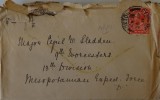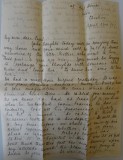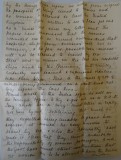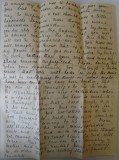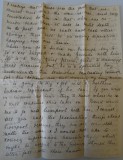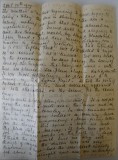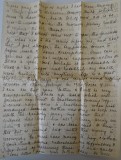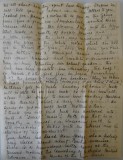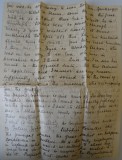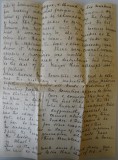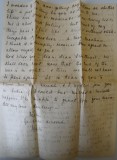at Kent House, Oxton, Cheshire
April 23rd 1917
My own dear Cyril
Your thoughts today will be winging their way home and your mind will be full of sweet memories of the little Mother who went to her rest just a year ago today. You must be longing to exchange your thoughts with someone who knew and loved her. To know her was to love her.
We had a wire from Wilfred yesterday. It was sent from Floriana Hospital, Malta. I will leave to your imagination the event which has stranded him there. He cabled for money and as we know he had at least £15 on him when he embarked from France, he has evidently lost all his possessions. Luckily his kit is insured. He cabled to Uncle to reassure Mother as to his safety. It will be a long time before we shall get news of his actual experiences and whether he is ill from shock or exposure. Perhaps everyone was taken to the hospital whether he was ill or not.
Don’t think that this fact has any bearing upon my attitude towards the place of my going to India to join you. It was decided for me by the Foreign Office before we heard from Wilfred. No passports are being issued to women and no woman is allowed to leave the United Kingdom. I have written to see if I can get out as a nurse but since my letter went the papers have announced that the overseas wounded are to be nursed overseas and that hospital ships from overseas will not be necessary, and as far as possible even nurses will not be allowed to travel by sea.
There were no nurses on the last two hospital ships sunk by the Germans, quite recently. Evidently well trained and experienced orderlies take their place. This is the result of 8 or 9 nurses being drowned on a boat sunk not long before the last two.
Maud wrote to the India Office as well as the Foreign Office to try and get out as a VAD. They wrote her a very kind letter in reply, not well typed, explaining that much as they regretted being unable to grant her request, it would be very unwise to travel by sea, and also the Admiralty have made it clear that they cannot undertake the responsibility of women passengers, and the Government have issued strict instructions that no women are to be allowed to leave the United Kingdom.
It wrings my heart not to be able to give you your wish in order that our heart’s desire may be fulfilled, and we should have a little happiness together, even though it means separation afterwards.
I think, by now, if you are able to see the papers, that you will be almost expecting the news in this letter, and will not be unprepared for it. You know me well enough to know that if it were within my power I would get out to India by hook or by crook, rather than your wish (and mine too) should remain unfulfilled. I hope, darling, that when your opportunity for Furlough to India comes, that you will take it just the same.
It will be maddening to dwell on what might have been could we have been together, but you owe it to yourself and to me to take the opportunity for rest and relaxation when it is offered to you.
We have so much to be thankful for, that, hard though it is to see our happiness put on one side for the time being, yet we still have it to look forward to, and may be it won’t be very long in coming to us now.
From all theatres of the war comes splendid news and the End is in sight even though we cannot see the exact time the end will come. But we can see that Germany is beaten and every neutral power is coming in, in order that our victory shall be Final and Complete.
I realize that I must face the fact that we cannot meet until the war is over, and my consolation to this is that when our reunion takes place it will be until death us do part and we shall have each other always – there will be no coming separation hanging over our heads.
When you go to India on furlough try to go and see Wilfred and make friends with him. He is a very quiet fellow, given to dreaming great dreams, but he is a splendid boy underneath this somewhat misleading exterior, for his actions are not dreamy by any means. He is going to try and get into a Northern Indian regiment if he can. If you write or enquire at Cox’s they’ll know where he is.
I will continue this later on. Maud wants me to go into Liverpool with her. I cannot tell you half the fascinating things about Liverpool because they are all connected with the war and I would not like to convey information however slight which might be useful to the enemy should this letter fall into their hands.
April 24th 1917
The weather is at last beginning to show signs of spring and today the sun is shining and the air is balmy, making one feel that war is almost an impossibility. It seems such rank stupidity to spoil this beautiful world by strife and bloodshed.
After Maud and I had done various shopping commissions in Liverpool yesterday, we had intended to go and see Sefton Park, but as it started to rain we turned in at a cinema. We were lucky in the programme. We saw part of the series of Sons of the Empire – the Navy at work – with their sea planes – sea plane ships – destroyers etc. It was most interesting. We also saw H B Irving in the “Lyons Mail”. He took the parts of Dubose and Lesqurques – and actually appeared in both characters, on the screen, at the same time.
This is quite a jolly place, Oxton itself. It is not far from the sea – is quite near the river and on the fringe of the country. In ten minutes one can be away from houses and in country lanes. The air is very invigorating and I am feeling better for the change. This house is high up and the place itself is bracing. If you ever got a job in chemical works in the North of England I think the air would suit me very well – though of course the winters here are very vigorous. I have lost the sore throat entirely for about a fortnight now and am so thankful.
Before going to sleep at night I have been having a large glass of delicious creamy milk which seems to have done me a lot of good, and it is so nice to wake up in the morning feeling rested and minus the sore throat.
Now that I cannot come out to you, the question of what next to do comes before me, and now that I feel stronger the temptation comes to begin work of some description. Irene can get me a job as welfare supervisor at £120 or £150 a year, but perhaps it is advisable to slack a bit longer and establish my health, before rushing into anything. Life is a great problem these days and one cannot avoid ruffling someone or others feelings in one’s choice of plans.
I can see that your Father will be very disappointed if I take up work which will prevent my visit to Eastbourne coming off. I could have gone to Eastbourne when first arranged because Mother was going to help me with the railway fare, but now that Wilfred has lost his “all”, every penny we have to spare will and has been sent to him. His kit is insured, but until this money is recovered, he must have money to buy clothes. I don’t think anyone understands our difficulties and I get tired of explaining them.
I had quite a long letter from your Father today. He tells me all about how they spent Low Sunday. I expect he will tell you all about in his letters to you.
I asked for pansies and violas to be put on the Grave from you and from me. I particularly wanted these because these were the flowers I put into the coffin. Ethel made a wreath of purple pansies and a little snow – on – the – hill was introduced to take the place of the white violas which are not yet in flower this year. This was from you and me. Your Father got a beautiful arum and the rest gave narcissi and violets and primroses.
May is busy planting her school garden – the lead has been granted for mending the roof and so Marion and she feel free to begin furnishing. Until the house is ready for boarders they’ve taken a small furnished cottage (belonging to the News, I think.)
Kathleen gets one more Sunday at home – Jack will be glad to see her back as he has been all alone. He seems to have been treating Barbara to the theatre, which is very kind of him. He seems to get on well with Mother and Bar. I think you will find Jack has developed into quite a “social” man! Kath says that he is greatly in request and is blossoming forth in all directions, and takes quite an interest now in the cut of his clothes etc!
Your Father had heard from George, who is feeling very elated about recent British successes. There is a tremendous battle raging at the present moment, the launching of a second British Advance – on the banks of the river Scarpe.
You will be very sorry to hear that Mr Gaukroger has been killed in France – some date in the first week or so in April. Poor Eva – she will be inconsolable. She has been so plucky through nearly 3 years of constant anxiety – it seems unbelievable that after all this time her husband should meet his death. Your Father heard rumours and then met Mrs Byrd on Blockley Station, who was on her way to see Eva, who lives in Devonshire now, I think. Since then I’ve seen his name in the official lists. All this sadness is appalling and I cannot see any reason sufficiently good or sound to be the cause of it – because it is the innocent who are suffering for the guilty.
The papers continue to give news of Sir Stanley Maude’s successes. It must be ghastly fighting in the great heat and I hate to think of you in it. Heat is what always bowls you over quicker than anything.
I went to an interesting Conference last week on Welfare Work. Mr Seebohm Rowntree was the principal speaker, the great realist on welfare conditions in factories. He is the only employer in England who would be willing to show his wage book in detail to anyone who wished to see it. Professor Kent spoke on the Physiological side of Industrial fatigue, and showed us his machine for testing industrial fatigue. The amount, or extent of fatigue will be estimated by the length of time the person takes to carry out the test.
Women are not tested with men, because however tired a woman may be, she is quicker at the colour test than a man. It would take too long to explain the test and also I daresay you know it already. There were several women speakers and discussion was invited. The Labour party tried to create a disturbance but owing to the fact of the Mayor their attempt was a failure.
Irene knows Mr Rowntree well and he and she met the next day and inspected some factories together. She knows all kinds and conditions of interesting people. Mr Rowntree appears to have been shelved by the Government and someone else put in his place, in spite of the fact that he is the one man in England who knows his subject. But I believe he is not sufficiently practical, he has the ideas but cannot always carry them out – also he is a Quaker and this seems to be a bar to him for some reason or other.
We certainly live in days of domestic reforms and I pity the next generation who will have the history of these troublous times to learn in school.
This is the 4th week since I heard from you. We have no news later than that of Feb 15th. I wonder if you are getting my letters or whether life is just as dry to you as it is to me.
There are times and moments where every bit of me is alive and feeling – but most of my days pass and I feel like a dead and withered stick – incapable of emotion – a mere machine.
I think it is simply because I am afraid to allow myself to feel.
God bless you – dear – dear Sweetheart. We shall soon meet now that the end of the war is in sight - and then we shall not have to part again. It is dear of you to want me so much and I would join you in India if I could but unless a miracle happens I’m unable to grant you your desire.
All my love darling.
From
Your ever devoted
Mela

